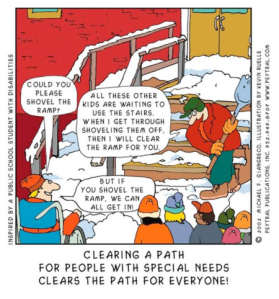Over at Reason and Wonder, Michael Fenton is exploring the possibilities for using Alex Gendler video puzzles in the classroom. Michael’s wonderful take on these rich resources, reminded me of one of the main goals of this blog, to show how students with disabilities can access rich mathematics instruction.
As we began this school year, my goal was to model how our class valued perseverance and sense-making over answer-getting. I did this for a couple of my classes by using Gendler’s Zombie Bridge Problem video. The video is long and there are a lot of details to account for before you can come to a reasonable solution. This requires quite a bit of what is called executive functioning. Executive functioning includes (but is not limited to) the abilities to initiate a task, make a plan, prioritize information, organize information, think flexibly about strategies, and self-monitor (i.e. check your work). Sound familiar? My students tend to struggle with executive functioning skills and this is often where my scaffolding is targeted.
To help scaffold my student’s executive functioning while solving the Zombie Bridge Problem, I used EDpuzzle. EDpuzzle allows a teacher to modify an already existing youtube or uploaded video by cropping it, including voiceovers and adding questions. Here is how I used EDpuzzle to scaffold the Zombie Bridge Problem.

First, I cropped the video to exclude the solution. As anyone familiar with 3-acts knows, the solution is vital, but should come after students have had time to explore first! So it was gone.


